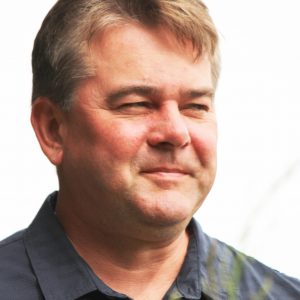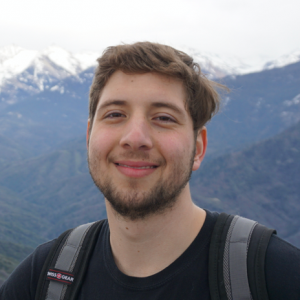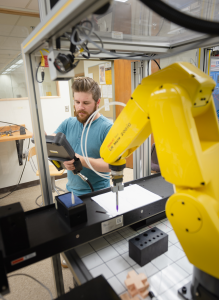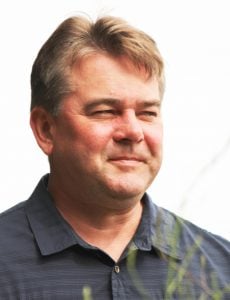Professor Aleksandr Segeyev (DataS), Applied Computing, and a group of Michigan Tech students presented two papers at the 2020 American Society for Engineering Education (ASEE) Gulf-Southwest Annual conference, which was conducted online April 23-24, 2020. Both papers received conference awards.

Faculty Paper Award
“Pioneering Approach for Offering the Convergence MS Degree in Mechatronics and Associate Graduate Certificate”
by Sergeyev, Professor and Associate Chair John Irwin (MMET), and Dean Adrienne Minerick (CC).

Student Paper Award
“Efficient Way of Converting outdated Allen Bradley PLC-5 System into Modern ControlLogix 5000 suit”, by Spencer Thompson (pictured), Larry Stambeck, Andy Posa, Sergeyev, and Lecturer Paniz Hazaveh, Applied Computing.
Sergeyev is director of the Michigan Tech Mechatronics Graduate Program and FANUC Certified Industrial Robotics Training Center.
Founded in 1893, the American Society for Engineering Education is a nonprofit organization of individuals and institutions committed to furthering education in engineering and engineering technology.

Alex Sergeyev, College of Computing professor and dirtector of the Mechatronics graduate degree program, was quoted in the article “Robotics key to Michigan’s economy,” published in the Grand Rapids Business Journal on November 22, 2019.
The article also mentions Michigan Tech’s 2018 partnership with Bay De Noc Community College to create a robotics and software development program, which offers a hands-on training program and an easy path for transferring from the community college to the university.
An article co-authored by Aleksandr Sergeyev, College of Computing professor, director of the Mechatronics graduate program, and member of the ICC’s Center for Data Sciences, has been published in the Journal of Engineering Technology (JET).
The conclusive article, titled “A University, Community College, and Industry Partnership: Revamping Robotics Education to Meet 21st century Needs – NSF Sponsored Project Final Report,” summarizes the work funded by a $750K NSF grant received by Servgeyev in 2015 to to promote robotics education. The paper details the grant-funded achievements in curriculum and educational tools development, dissemination, and implementation at Michigan Tech and beyond.
Co-PIs on the project are Scott A. Kuhl (Michigan Technological University), Prince Mehandiratta (Michigan Technological University), Mark Highum (Bay de Noc Community College), Mark Bradley Kinney (West Shore Community College), and Nasser Alaraje (The University of Toledo).
A related paper was presented at the 2019 ASEE Annual Conference & Exposition, June 21-24, 2019, in Tampa, FL, as part of the panel “Academe/Industry Collaboration” presented by the Technical Engineering Technology Division, where it was awarded the Best Paper Award in the Engineering Technology Division. Download the conference paper here: https://www.asee.org/public/conferences/140/papers/26234/view.
Conference Paper Abstract: Recently, educators have worked to improve STEM education at all levels, but challenges remain. Capitalizing on the appeal of robotics is one strategy proposed to increase STEM interest. The interdisciplinary nature of robots, which involve motors, sensors, and programs, make robotics a useful STEM pedagogical tool. There is also a significant need for industrial certification programs in robotics. Robots are increasingly used across industry sectors to improve production throughputs while maintaining product quality. The benefits of robotics, however, depend on workers with up-to-date knowledge and skills to maintain and use existing robots, enhance future technologies, and educate users. It is critical that education efforts respond to the demand for robotics specialists by offering courses and professional certification in robotics and automation. This NSF sponsored project introduces a new approach for Industrial Robotics in electrical engineering technology (EET) programs at University and Community College. The curriculum and software developed by this collaboration of two- and four-year institutions match industry needs and provide a replicable model for programs around the US. The project also addresses the need for certified robotic training centers (CRTCs) and provides curriculum and training opportunities for students from other institutions, industry representatives, and displaced workers. Resources developed via this project were extensively disseminated through a variety of means, including workshops, conferences, and publications. In this article, authors provide final report on project outcomes, including various curriculum models and industry certification development, final stage of the “RobotRun” robotic simulation software, benefits of professional development opportunities for the faculty members from the other institutions, training workshops for K-12 teachers, and robotic one-day camps for high school students.
 The Journal of Engineering Technology® (JET) is a refereed journal published semi-annually, in spring and fall, by the Engineering Technology Division (ETD) of the American Society for Engineering Education (ASEE). The aim of JET is to provide a forum for the dissemination of original scholarly articles as well as review articles in all areas related to engineering technology education. engtech.org/jet
The Journal of Engineering Technology® (JET) is a refereed journal published semi-annually, in spring and fall, by the Engineering Technology Division (ETD) of the American Society for Engineering Education (ASEE). The aim of JET is to provide a forum for the dissemination of original scholarly articles as well as review articles in all areas related to engineering technology education. engtech.org/jet
College of Computing Professor Alex Sergeyev (DataS) presented his research article, “University, Community College and Industry Partnership: Revamping Robotics Education to Meet 21st Century Workforce Needs – NSF Sponsored Project Final Report,” at the 2019 American Society of Engineering Education (ASEE) annual conference, receiving the Best Paper Award in the Engineering Technology Division.
The conference took place June 16-19 in Tampa, Florida.
Co-authors of the publication are S. Kuhl, N. Alaraje, M. Kinney, M. HIghum, and P. Mehandiratta. The paper will be published in the fall issue of the prestigious Journal of Engineering Technology (JET).
